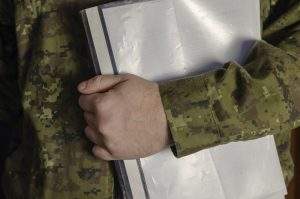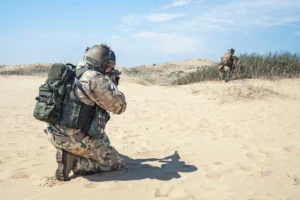Amongst the chatter of children, the smell of mini-chimichangas and the occasional yap of a companion animal, eight military service veterans received certificates and ceremonial coins Saturday acknowledging completion of the Regional Municipalities Veterans Treatment Court program, and dismissal of the misdemeanor charges against them.
The program, also known as Veterans Court, started in 2009 to assist veterans and active-duty service members who had run-ins with the law, and landed in a courtroom.
During an arrest, if law enforcement or screeners in the jail discover they are dealing with a veteran, that person could end up in the courtroom of Judge Michael Pollard.
Thats where Army and Arizona National Guard veteran Tracy Gibson found himself about six months ago.
I was homeless and unemployed, Gibson says. Im finding out now, through my time in Desert Storm, that Im suffering from PTSD. It was real hard for me to settle back into society.
With the help of RMVTC, Gibson began receiving regular services from the VA, and says he probably would not have sought that help otherwise. He now has stable housing and a job.
Wednesday was Gibsons final court date, and when Pollard dismissed the charges and shook the hand of the mutton-chopped veteran, cries of Hooah! and applause filled the courtroom.
Pollard himself is a Marine Corps veteran of the Vietnam War, and runs the court that meets every other Wednesday with the blend of discipline and candor that marks every aspect of the RMVTC program.
The treatment court format is similar to national diversion and drug courts, but is tailored to the needs and strengths of veterans.
The collaboration comprising city prosecutors, law students, the Department of Veterans Affairs and community-service providers Old Pueblo Community Services and La Frontera Arizona gives veterans who may not be able to receive VA benefits the chance to get services from one of the other partners.
If they accept and complete the plan proposed to them by the court, their charges will be dismissed.
Reintroducing the structure learned in the military that many veterans lose in civilian life is crucial, Pollard says. But he is quick to point out veterans in RMVTC are not getting special treatment.
If a person was eligible for diversion outside of Veterans Court, theyd get diversion, Pollard says.
The close monitoring and rigorous schedule of RMVTC is what makes it so helpful to veterans in particular, he says.
If youve ever been in the military, you know they teach you regimentation till its coming out your ears. And they take to it like a duck to water.
The programs reported 2.3 percent recidivism rate for graduates in the first year is a dramatic improvement over the 14 to 25 percent reported in a 2003 Department of Justice publication on drug court effectiveness.
The secret sauce that makes RMVTC so effective, says Pollard, is the mentors.
Every incoming veteran is assigned a mentor who was in the military and whose primary job is to pick up the phone when it rings. They make sure the court participants are getting to the slew of meetings and appointments required in their individually-designed six-month programs.
Veterans who dont fulfill their requirements, drop out for some reason or re-offend go back to traditional court and must make their way on their own.
For Mario Nava, 28, that relationship made all the difference. Nava spent a year in Iraq with the Army. After leaving the military in 2012, he says he was depressed and drinking a lot.
Eventually, a series of bad decisions found him in Pollards courtroom. He was assigned mentor Abel Moreno, an Army veteran and service administrator with La Frontera who shook Navas hand and clapped him on the back at the celebration on Saturday.
You go from somewhere where its disciplined and theres a structure; you have a job and a purpose, Nava says. And then when you get out and it kind of sets in, its like, What do I do now?
Just being around other veterans and Abel and talking, finding out Im not the only one going through this … When (I was) feeling weak, Id call Abel and wed go get a Subway or go for a run or something. Watching them help me gave me a purpose: to better myself for them, because were all in this for each other.
Nava says he would not have sought treatment without the court, and is now looking into becoming a mentor himself.
Veterans Court is funded by a federal grant disbursed by the Substance Abuse and Mental Health Services Administration, and has just procured two additional grants that will allow doubling of full-time staff from one member to two.
Robert Kayser, program coordinator at La Frontera, peer navigator with RMVTC, and a Navy and Army Reserve veteran, says with that doubled capacity to help people, the next challenge is finding veterans who could benefit.
If youre not a veteran or someone who has a loved one in the military, generally the idea of a veterans treatment court seems unimportant, somehow, he says. (But) if theyre suffering from PTSD or some kind of depression as a result of their service, theyre probably self-medicating.
If we can find them some other substance thats legal or get them some behavioral health (treatment) to change those behaviors, lets do that. Lets not send our veterans to jail.
In the ceremony Saturday, surrounded by children and loved ones, the eight graduates ate, chatted, shook hands and exchanged hugs with mentors, program coordinators and court staff. The graduates join 255 veterans who have successfully completed treatment programs to date.
Notice the rapport thats developed between the counselors, Pollard says. Theres nothing better for them or for us than working with someone and having them succeed.





